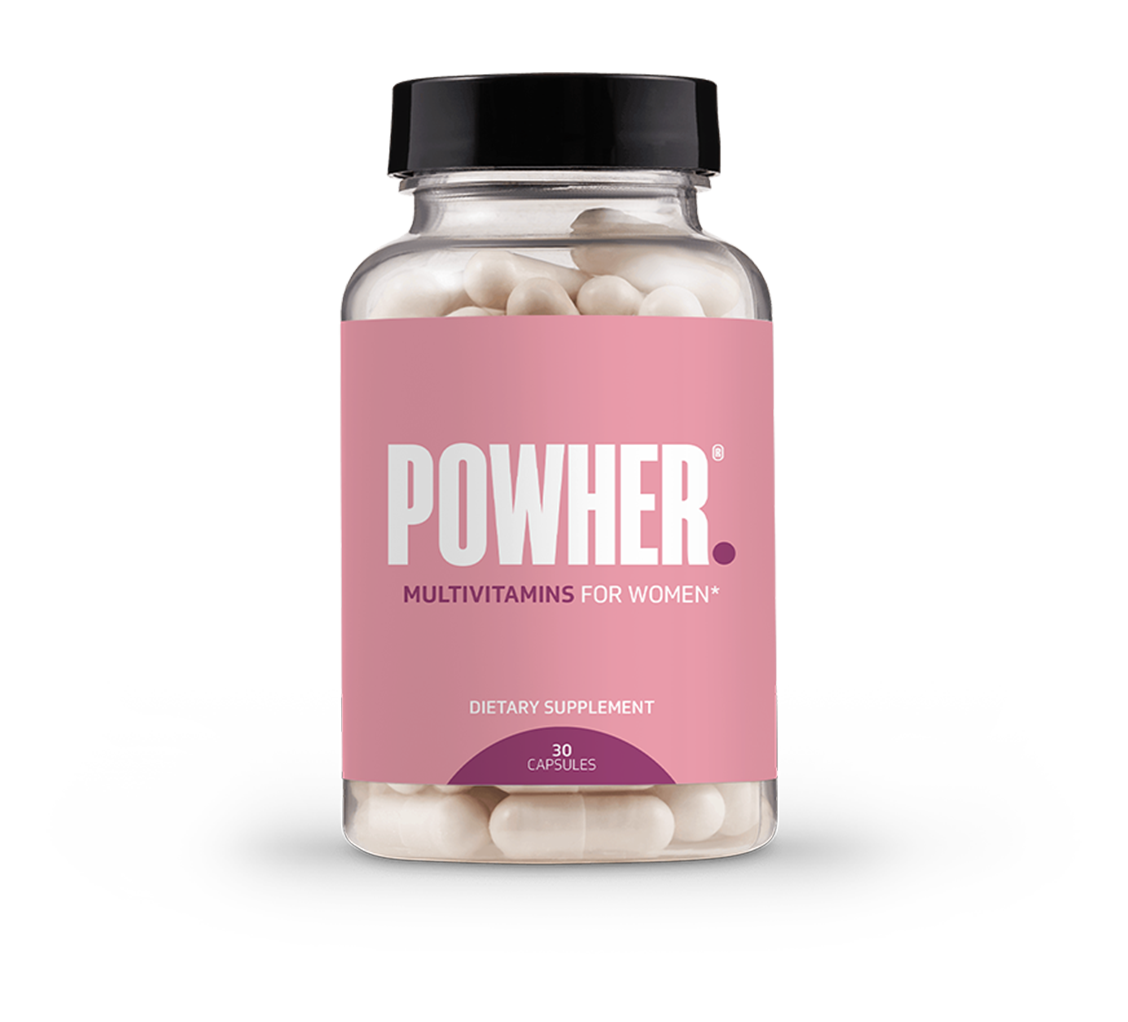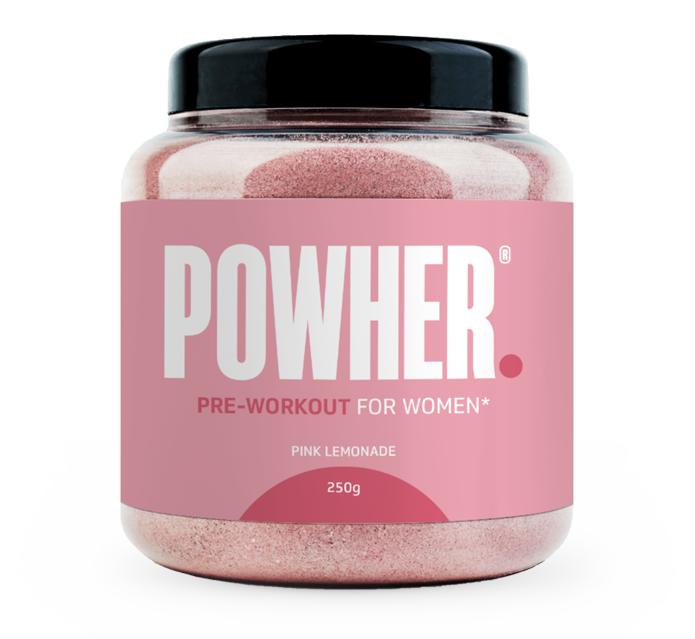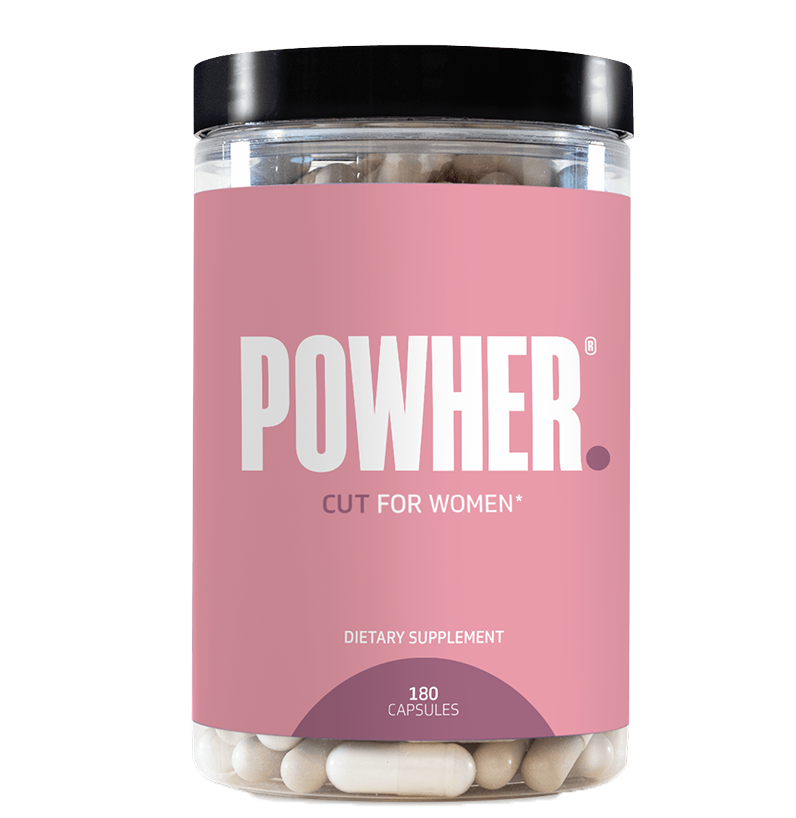Are you lacking in the energy department? If your energy is subpar, this can affect your motivation to exercise and prep healthy meals. Getting in the right vitamins to boost energy can help you feel your best, crush your workouts, and achieve your health and fitness goals faster.
Women’s nutritional needs are unique, so getting in the most important vitamins in the right amounts is essential for peak fitness performance. In addition to a healthy balanced diet, a female-focused multivitamin can help you get in the women’s vitamins for energy that you need to charge you through your days.
This article will share the 9 best women’s vitamins for energy, where to find them in your diet, and how a women’s multivitamin can help supplement your daily needs.
Why Do You Need Vitamins for Energy?
Essential vitamins and minerals provide energy by helping your body work more efficiently. There are several specific ways vitamins and minerals can support optimal energy levels by:
- Supporting a healthy metabolism
- Helping digest the food you eat
- Promoting bone health and strength
- Providing energy to muscles and joints
- Transporting oxygen throughout the body
- Bolstering your immune system

Vitamins and minerals work together as a team to help you get through daily tasks, fuel your workouts, and enhance your focus at work. However, the reality is many women are not able to get in enough of these essential nutrients from diet alone.
In this case, a quality women’s multivitamin can help bridge that gap.
How are Women’s Nutrition Needs Different?
Women’s nutritional needs are different than men’s and should be treated as such. For example, women need more folate, iron, and calcium than men for various reasons.
Women are also more susceptible to weakened bones over time than men, which is why adequate calcium intake is so important. Women’s nutrition needs also change during menopause, when they need even more calcium to reduce the risk of bone loss.

Furthermore, women are at a higher risk of iron deficiency due to blood loss from menstruation. For example, the average woman requires around 18 mg of iron per day compared to only 8 mg for men.
And if you’re an active woman, it’s even more important to get it enough of these key nutrients to power your workouts and feel your absolute best.
9 Best Women’s Vitamins to Boost Energy
There are 9 specific vitamins to boost energy that are especially essential for women’s health. Let’s review each one of them separately and why they’re important.
1. Calcium
When you think of calcium, strong bones and teeth are probably the first things that come to mind. These are critical benefits because if you maintain strong bones, this helps reduce injury during workouts and allows you to perform your best.
But calcium can also boost energy by supporting a healthy metabolism and enabling regular heart and muscle contractions. These contractions are necessary for health and to provide needed energy during workouts.
Observational studies have also shown a link between calcium intake and reduced body weight as an added benefit.

Calcium-rich foods include dairy and dairy alternatives like soy milk, soybeans, leafy green vegetables, canned salmon, and calcium-fortified foods. If you avoid dairy or non-dairy alternatives, it can be harder to meet your calcium needs solely through diet.
In this case, you can take a calcium supplement, but make sure it also contains vitamin D. This is because vitamin D aids in calcium absorption.
2. Vitamin D
Vitamin D intake is also linked to optimal energy. This critical vitamin often works as a dynamic duo with calcium, helping to enhance calcium absorption.
Vitamin D may help the mitochondria – the energy centers of our cells – power various parts of our body including our muscles. This can assist your muscles in working more effectively, which can help you push harder at the gym with less effort.
One study also showed taking a vitamin D supplement decreased perceived fatigue. These results may help explain why getting in some sunlight instantly recharges you.
Vitamin D food sources include salmon, cod liver oil, mushrooms, cow’s milk, soy, sardines, and fortified foods. The best way, however, is to obtain vitamin D directly from the sun. Unfortunately, many people are not able to get enough sunlight, and in these cases, a vitamin D supplement can be beneficial.
3. Folic Acid
Folic acid, or folate, is one of the essential B vitamins. Folate is the form naturally found in food, and folic acid is the synthetic version more often added to food and supplements. It is emphasized during pregnancy for its role in preventing neural tube defects, but it is also a necessary nutrient for energy for all women.
Folic acid converts carbohydrates in our food into glucose, our body’s main energy source. It also works directly with vitamin B12 to make red blood cells that transport oxygen throughout our body. Without enough folic acid, you may find yourself feeling physically and mentally fatigued or more forgetful.
Folate-rich food sources include leafy greens, beans, peanuts, sunflower seeds, and fortified whole grains. You can also take it as a supplement as part of a women’s multivitamin.
4. Iron
If you’ve ever been iron deficient, you probably know how much it drains your energy. A lack of iron can negatively affect your stamina, leaving you feeling sluggish and weak. This is because iron is crucial for the transport of needed oxygen to your brain, organs, and muscles. It is therefore critical for peak mental and physical performance.
Women need more iron than men because of menstruation and also during pregnancy. Iron is found in red meat, pork, poultry, seafood, beans, and dark green leafy veggies.
The type of iron in plant sources is called non-heme iron and is not absorbed as well as the heme iron in animal products. Therefore if you’re a vegetarian, you are at a higher risk for iron deficiency.
If your iron intake is not consistent or you follow a vegetarian diet, a supplement can help fill in these gaps.
5. Vitamin E
Vitamin E is a potent antioxidant that facilitates proper cell signaling in the body. This cell signaling is necessary for processes like absorption, digestion, and movement to occur properly throughout the body.
It is also known for its ability to scavenge unstable molecules in our environment called free radicals, preventing them from causing damage to our cells. Preserving healthy cells helps maintain optimal healthy energy levels so our body functions at its best.

Vitamin E-containing foods include wheat germ, sunflower seeds, almonds, peanuts, and leafy greens.
6. Magnesium
Magnesium is an essential mineral that has been receiving increased attention in the nutrition world. It helps support optimal muscle and nerve function, essentials to supercharge your workouts.
Magnesium may also help convert glucose (carbs) in food into energy. By doing this, it may help maintain healthy blood sugar levels and provide steady energy throughout the day.
Foods high in magnesium include whole grains, dark green leafy veggies, beans, and nuts such as almonds and cashews.
7. B-complex vitamins
The B-complex vitamins such as vitamins B1, B6, and B12 support healthy energy levels. Studies suggest B vitamins are involved in nutrient metabolism, which helps to convert our food into energy.
There are 8 B-complex vitamins, one of which is folate:
- Vitamin B1 (Thiamine) – This vitamin plays an essential role in metabolism and helps convert our food into fuel. Good food sources include pork, wheat germ, and sunflower seeds.
- B2 (Riboflavin) – Similar to vitamin B1, Vitamin B2 also helps turn our food into a fuel source. Foods high in riboflavin include organ meats, beef, and mushrooms.
- B3 (Niacin) – Niacin facilitates cell signaling, metabolism, and DNA production and repair in the body. This process helps remove damaged DNA and makes space for healthy, well-functioning DNA for proper energy. Food sources include chicken, tuna, and legumes.
- B5 (Pantothenic Acid) – Like some other B vitamins, pantothenic acid helps you obtain energy from your food. It also helps produce necessary hormones and cholesterol. Good sources include liver, fish, avocado, and yogurt.
- B6 (Pyridoxine) – Provides energy through its involvement in amino acid metabolism and red blood cell production for oxygen transport. Amino acids are protein-building blocks necessary for optimal energy and building muscle. Foods high in vitamin B6 include salmon, potatoes, and chickpeas.
- B7 (Biotin) – Biotin is important specifically for carbohydrate and fat metabolism, helping you utilize the nutrients broken down from these foods. This is essential in terms of providing you with the energy you need. The best sources of biotin include salmon, eggs, cheese, and liver.
- B9 (Folate) – As mentioned above, folate converts carbs into glucose, our body’s preferred energy source. It also works closely with vitamin B12 to facilitate oxygen transport. This oxygen transport is necessary for you to have stamina during cardio sessions that require oxygen.
The best folate sources include leafy greens, beans, peanuts, sunflower seeds, and fortified whole grains.
- B12 (Cobalamin) – Vitamin B12 is vital for the production of new, healthy DNA and red blood cell development. Red blood cells carry and transport iron and oxygen throughout the body, a necessary facet for optimal energy.
Vitamin B12 is mainly found in animal sources like meats, seafood, eggs, and dairy. If you are a vegetarian, consider taking a supplement containing B12 to meet your needs.
8. Vitamin C
Vitamin C is not just good for your immune system – it is involved in a whole slew of energy-producing chemical reactions in the body. It also can enhance iron absorption, helping to transport oxygen through the body for energy. This may be especially true in terms of non-heme iron that is in vegetarian sources. It’s, therefore, possible that vitamin C along with iron can help you best utilize the iron you’re taking in.

Eating more vitamin C-rich foods like citrus fruits, tomatoes, strawberries, and bell peppers with iron-containing foods may improve your iron levels. Powher’s line of personalized multivitamins provides these women’s vitamins for energy and more.
9. Choline
Choline is a little-known nutrient necessary for fat metabolism helping break down fat for energy. It is also linked to improved memory, focus, and cognitive function. All of these things can improve both your physical and mental stamina, getting you through tough days.
It may be especially important during pregnancy to support the baby’s cognitive development in utero and beyond.
Choline is found in a few select foods – egg yolks, liver, and red meat. Because it is not naturally found in most foods, it can be difficult to get in enough through your diet alone.
Takeaway – The Best Women’s Vitamins for Energy
The top women’s vitamins to boost energy can turbocharge your workouts, increase your stamina, and help you perform at your very best. These energy-producing vitamins can be found in both food and supplements to help meet your daily needs.
Consistency in getting in these vitamins is key and will yield the biggest benefits to your health and energy levels. While many of these vitamins are found in common foods, it’s not always easy getting them in consistently in your diet.
If you struggle to eat enough variety in your diet, taking a women’s multivitamin supplement can provide a sense of security and peace of mind. Powher’s complete multivitamin products are designed by experts specifically with active women in mind.
Visit our Powher multivitamin product page for more information and to see how Powher’s vitamins can become part of your daily wellness routine.
Disclaimer: The information on the Powher blog does not constitute medical advice and should not be used as such. If you would like to learn more about your dietary requirements and related aspects of your health, speak with a registered medical professional.




